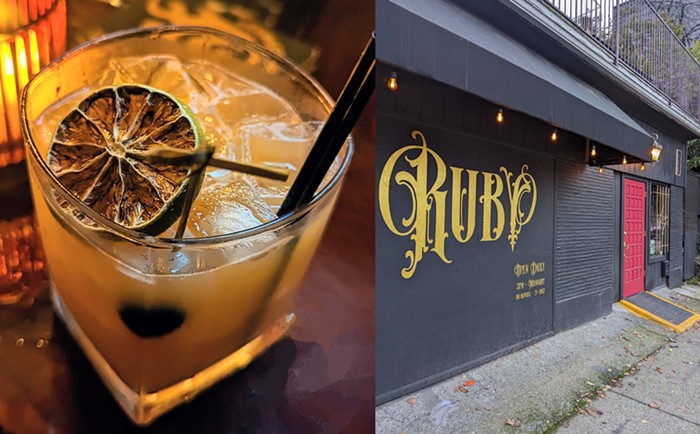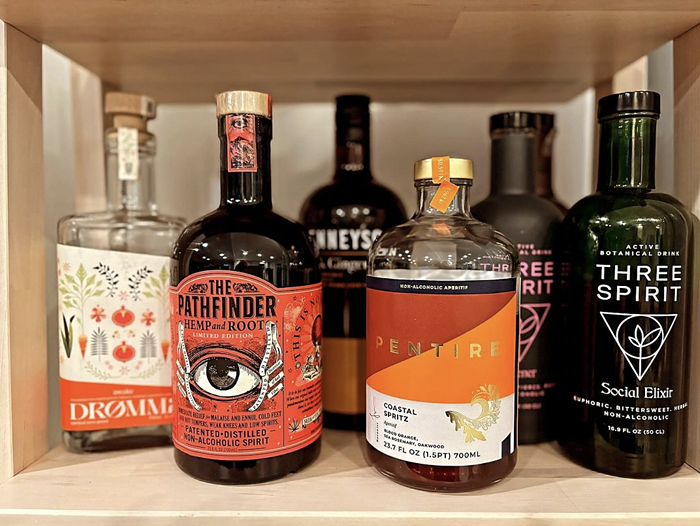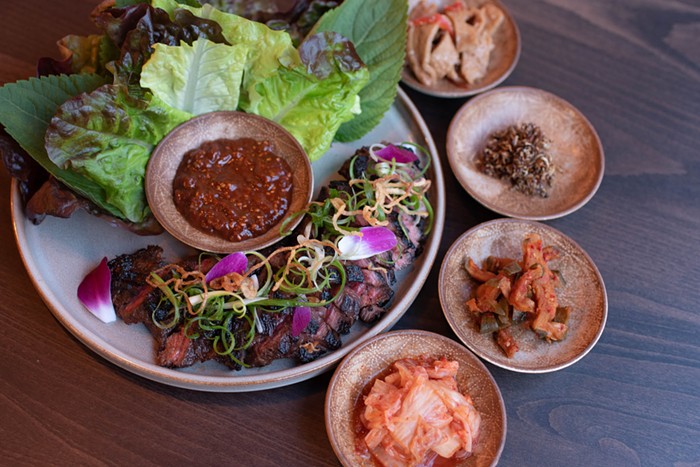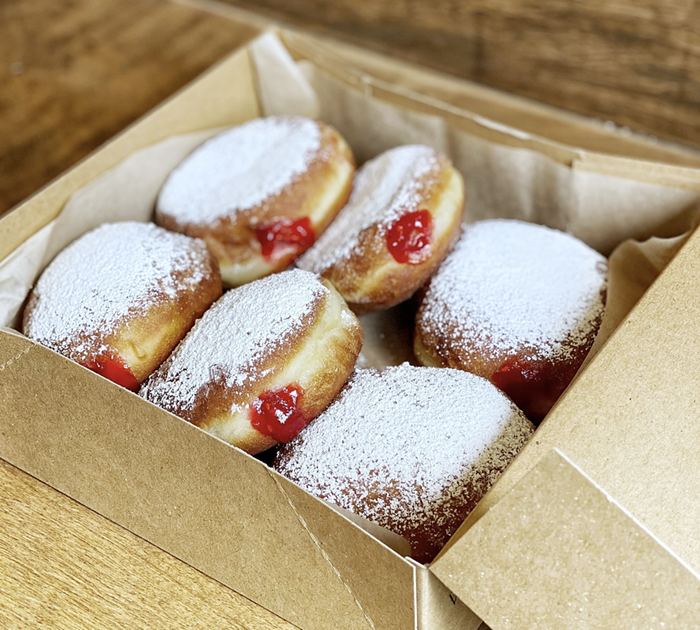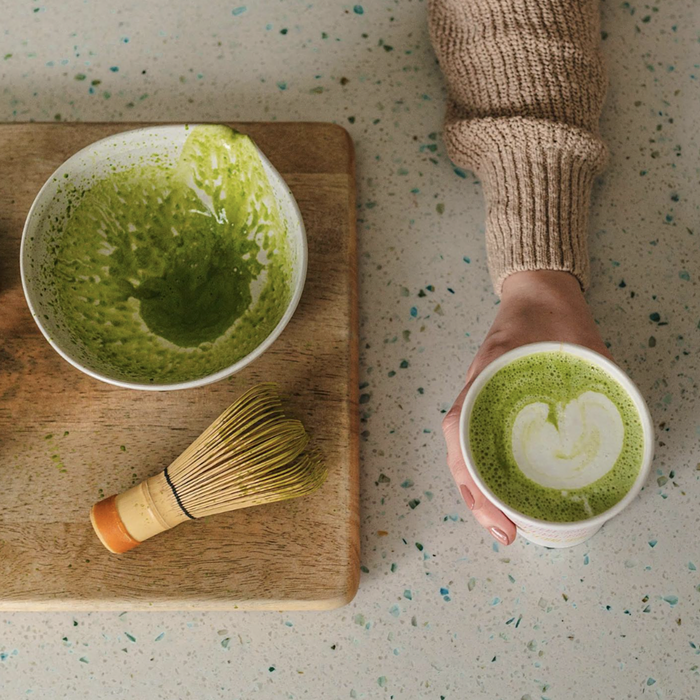The Pine Box opened last summer in the former chapel of Butterworth Mortuary. With its leaded glass windows, enormous mirrors, ornate dark woodwork, vaulted ceiling, and antique fixtures, it's the most gorgeous space on Capitol Hill. (The club called Chapel that preceded it was glam and seedy, with service so slow that you might've actually expired before getting a drink.) The Pine Box is headed up by beer guru Ian Roberts, former Brouwer's manager and a founder of Seattle Beer Week (which is sure to be celebrated mightily at the Pine Box starting May 9—and lasting 10 days, as a beer-related week should).
The chapel works marvelously as a beer hall. Its mighty airspace makes for an ungodly, joyous clatter and din when the place is full—yes, it is loud, loud with the laughter that comes from 33 rotating taps of great beer. ("I'm in a snow globe of noise," someone shouted, not unhappily.) Sit upstairs, in what was probably the choir loft, and watch this happy universe from on high: The bartenders filling up specially shaped glasses with their specific brews, the patrons making themselves at home in the church-pew booths, the kitchen staff tossing pizza dough in the open kitchen. The people who work here are universally good-looking in an unintimidating way (except the bouncer, who is great-looking in a completely intimidating way). Up above the bar: a two-foot-tall Darth Vader, a baby doll with its face painted like Ace Frehley, a full-size beach cruiser bike, a statue of a raven, some model racecars. And: two flat-screens showing what's on tap, including exact serving size, percent alcohol, and price. While the information is nerdily nice, the signs can only remind you of the arrival/departure ones at the airport, thoroughly clashing with the mortuary/beer-hall aesthetic. Oh well—at least it's beer, beer that's going to be arriving at your mouth.
The Pine Box isn't the kind of place that seems like it would try hard when it comes to food. This isn't meant unkindly—only that with the fantastic beer selection, they could just slap together some pub grub and call it a day. Instead, they called in local food genius Scott Carsberg, renowned for his former restaurants Bisato and Lampreia, to help design a beer-friendly, higher-reaching menu. Note that Carsberg is not in the kitchen; this was a consulting job, and his hands are now off the wheel, which must be difficult for such a notorious perfectionist. How's the kitchen doing? Is the food at the Pine Box as good as the beer?
Some of it is. The beef short rib—a Flintstones-sized block of meat served with tzatziki salad and a shiitake-Parmesan strudel for $15—was fantastic. The meat was everything that it should be—almost creamy in texture, deep in flavor—plus, for once, possessed of a slight, perfect spicy heat. The salad was a fine companion, creamy in its own way. And the strudel was a big, beautiful handheld pie, made with light layers of phyllo pastry and an earthy, savory mushroom filling, all covered in a dusting of Parmesan. The Chuckanut Baltic porter that the server recommended to go with it was exactly right—malty and toasty and roasty, with notes of chocolate and coffee, mirroring and expanding the flavors of the meat (and also almost the same color of very darkest brown).
A small plate of whole-milk burrata was not all that small, with two big blobs of the cheese, a house-made pretzel, and three dips/salads for $9. The burrata was, as usual, like fresh mozzarella made by angels; the pretzel was a grand example of the form, causing near-compulsive eating; and the apple chutney was also especially fine, spicy and full of currants. In a signature Carsberg touch, the tomato on the plate was peeled and cored and chilled, made into the essence of itself—quite fancy for a beer hall.
More of those tomatoes appeared in a very pretty romaine salad ($7), made with pickled egg instead of just hard-boiled, plus a blue cheese crème dressing, and, unfortunately, too much shallot in too large of hunks, making for an acrid taste. Carsberg would never have let that out of the kitchen, but still, it was big and fresh and overall fine. (Asked about the tomatoes, the amiable server said that it was some kind of time-consuming process, and that they looked kind of weird but tasted "awesome." True.)
A dish of prawns with Beecher's cheddar grits ($9) was good, with the grits baked into a casserole-style texture, spiced with paprika and cayenne, and given a bubbling lid of more cheese. The prawns, however, didn't have quite the delectable texture they could and should.
But those prawns were stellar compared to the ones in "basil nut pesto" ($12) another night. The pesto was a rusty-brown colored paste, pressed into a dirtlike bed on the plate; the texture was pasty, the taste faint but burnt-nutty. The prawns were chewy. How to integrate the two was a mystery that you did not want to solve. Also subpar: spaetzle with brown butter, sage, and shiitakes ($8). The noodles were light and tender, plump and squiggly, but the shiitakes were flavorless, and the brown butter and sage were possibly entirely absent—the dish was dry and bland.
Both the pizza (mozzarella and sausage version, $13) and the Italian sausage plate ($10) were stand-up versions of classic beer food—absolutely something you'd order again. And if it's not clear by now, portions here are generous, and the Pine Box also uses only local, ethically sourced meats and vegetables, making the prices even more remarkable. And the late-night menu goes until one o'clock in the morning.
The Pine Box is not Lampreia, nor would it want to be. It's loud and pretty and a great deal of fun, and the food's worth a try, especially to go along with all the excellent beer. ![]()
